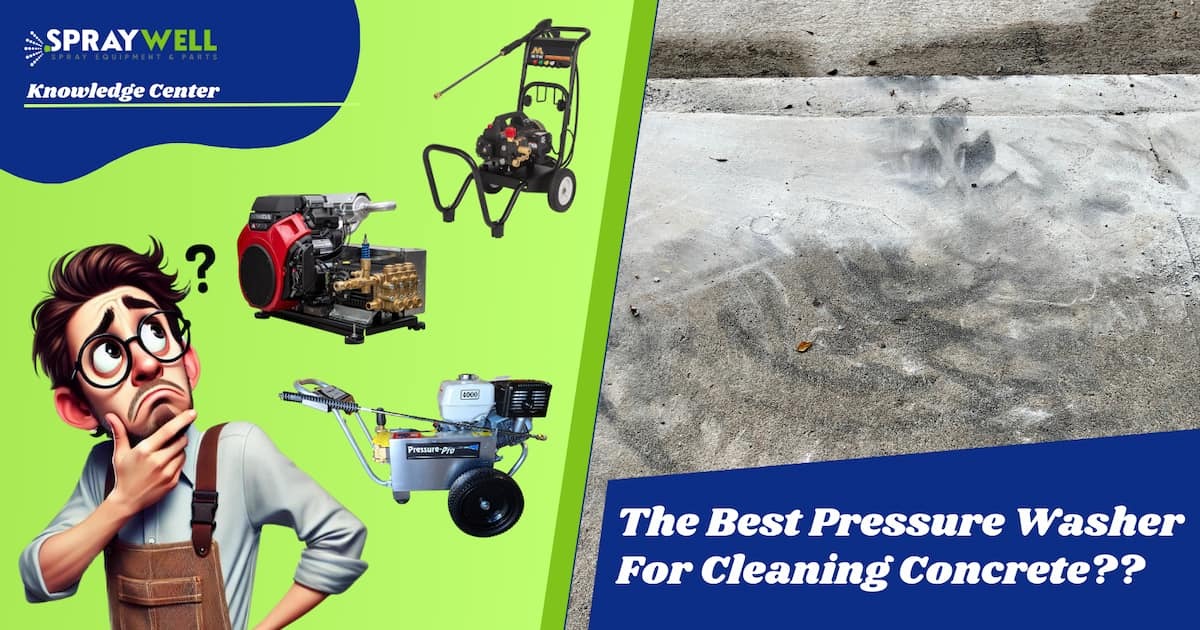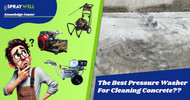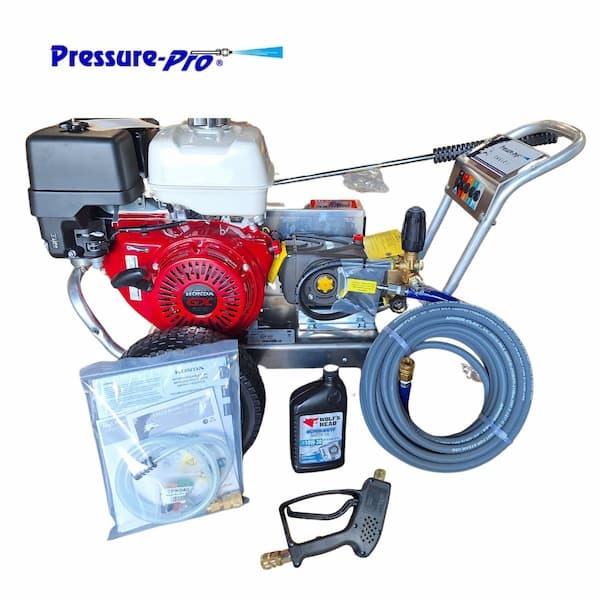The Best Pressure Washer For Concrete | Truth vs Myth
09/ 30/ 2024 by Jeff

Cleaning concrete surfaces requires the right tools and techniques to get rid of embedded dirt, grime, and stains.
A powerful pressure washer really kicks butt for restoring the appearance of concrete, but not all pressure washers are created equal.
Choosing the right PSI level, type of pressure washer (gas or electric), and cleaning technique is crucial for achieving the desired results.
In this guide, we’ll explore the best pressure washers for concrete surfaces, discuss the optimal PSI levels, and help you decide between gas or electric models based on the size of your job.
Understanding PSI and GPM: What’s Best for Concrete?
When it comes to pressure washers, two factors determine their cleaning power: PSI (pounds per square inch) and GPM (gallons per minute). For concrete surfaces, these numbers need to strike a balance to effectively clean without causing damage.
In our experience, 3,000 PSI is the sweet spot for residential concrete cleaning. It strikes a balance between power and surface safety, ensuring that you can get rid of deep-seated dirt without damaging the surface of your concrete.
There's a reason professionals never use electric units on concrete; even for small jobs.
PSI Levels for Concrete Cleaning
- Low PSI (1,500-2,500 PSI): Suitable for lighter tasks like washing outdoor furniture or cars, this range is typically too weak for deep concrete cleaning. It may remove loose dirt, but it won't effectively tackle embedded grime or organic stains like oil or mildew.
- Moderate PSI (2,500-3,000 PSI): For most residential concrete cleaning jobs, such as driveways, patios, or sidewalks, 2,500 to 3,000 PSI is ideal. It offers enough power to remove stubborn stains, dirt, and grime without risking surface damage.
- High PSI (3,000-4,000 PSI): Commercial-grade pressure washers operate within this range. They’re perfect for large jobs, heavily stained concrete, or cleaning industrial surfaces. However, for regular home use, these powerful washers can be overkill and even potentially damage softer concrete surfaces if not used carefully.
Choosing Between Gas and Electric Pressure Washers
Before going any further, I want to say this: If you're serious about cleaning concrete properly, and are dealing with heavily embedded stains, gas pressure washers are the way to go.
The choice between a gas or electric pressure washer for boils down to the size of the surface area and the nature of the job.
The nature of deeply stained concrete can be summed up in one word: STUBBORN.
In most cases, people are dissatisfied with electric pressure washers when it comes to cleaning concrete. Electric units just don’t have enough power, and the embedded dirt is just too stubborn for a wimpy electric pressure washer to handle.
Gas Pressure Washers | Your Best Bet
Gas pressure washers are known for their higher power and mobility, easily exceeding the common 2000 PSI threshold you see on electric units.
The Pressure Pro 4000 PSI 4 GPM pressure washer shown here is a great example of a powerful pressure washer that can handle tough concrete cleaning jobs with embedded dirt or organic staining.
Gas Unit Pros
- Higher PSI (usually 2,500 to 4,000 PSI), making it more effective at removing embedded grime and organic stains.
- Greater portability, as they don’t require an electrical outlet.
- Ideal for large jobs like driveways, patios, or even commercial properties.
Gas Unit Cons
- Heavier and noisier.
- Requires regular maintenance (oil changes, fuel refills).
- Gas-powered engines produce exhaust fumes, which may not be ideal in smaller, enclosed areas.
Best for: Large jobs or frequent use. Gas pressure washers are ideal if you have multiple concrete surfaces to clean or particularly tough stains like oil, algae, or mildew.
Electric Pressure Washers
Electric pressure washers are lighter, quieter, and easier to maintain. They can be effective for smaller concrete areas with light staining, but that’s not really what we’re talking about here is it?
Although electric pressure washers lack the PSI for heavy duty concrete cleaning tasks, they have some advantages worth mentioning:
Electric Unit Pros
- Lighter and easier to maneuver.
- Low maintenance—no need to worry about gas or oil.
- Quieter operation and no fumes, making it ideal for small to mid-sized jobs or indoor use.
Electric Unit Cons
- Limited power, typically ranging from 1,500 to 2,000 PSI.
- Requires access to an electrical outlet, limiting portability.
Best for: Small to jobs like cleaning patios, small sidewalks, or less stubborn stains. If you only use a pressure washer occasionally or want something lightweight and easy to handle, an electric washer should suffice.
Effective Methodology for Cleaning Concrete
Using the right technique is just as important as choosing the best pressure washer. Here’s a step-by-step guide to get the most out of your machine when cleaning concrete:
- Pre-Clean the Surface: Sweep the concrete to remove loose debris like leaves, dust, and small rocks. Pre-cleaning helps ensure that the pressure washer’s water and cleaning solution can penetrate the surface more effectively.
- Apply a Cleaning Solution: Use a concrete cleaner or detergent designed for pressure washers. For tough organic stains like oil, mold, or mildew, look for a solution that targets these specific problems. Apply the cleaner to the surface and let it sit for the requisite time.
- Choose the Right Nozzle: Pressure washers come with interchangeable nozzles, each offering a different spray pattern. For concrete cleaning:
- 15-degree nozzle: Ideal for concentrated cleaning, particularly for stubborn grime.
- 25-degree nozzle: Good for general cleaning of concrete, providing a broader spray for more even coverage.
- Start Cleaning: Hold the pressure washer wand about 6-12 inches from the concrete surface. Move the wand in smooth, sweeping motions, making sure to overlap slightly for even coverage. Avoid holding the nozzle too close to prevent gouging the surface.
- Rinse Thoroughly: After cleaning, rinse the area with water to remove any remaining detergent or grime. Make sure the surface dries fully before walking or driving on it.
When Do I Need a Surface Cleaner?
While a gas pressure washer can do an excellent job of cleaning concrete, there are situations where a surface cleaner is a more efficient and effective option:
- If you need to cover a large area, a surface cleaner is a huge time saver, allowing you to cover much more square feet in a fraction of the time.
- Concrete surfaces that have accumulated oil, grease, or other organic stains over time often require more than just high pressure to be cleaned effectively. A surface cleaner's rotating nozzles provide a consistent, high-pressure cleaning action that can lift even the toughest stains.
- Using a narrow-tip nozzle on concrete can sometimes lead to gouging or damaging the surface, especially when using high PSI levels. Surface cleaners distribute the pressure evenly, reducing the risk of damage to the concrete while still delivering powerful cleaning action.
Conclusion | Which Pressure Washer is Best for Concrete?
For cleaning tough stains on concrete, a gas unit with at least 3000 PSI is the best option.
For smaller, less intense jobs, you may be able to get away with an electric pressure washer. However, our recommendation is to just use a gas powered unit, and save yourself the headache. Even if you need to rent a gas unit for the day or weekend, you’ll be glad you did.


